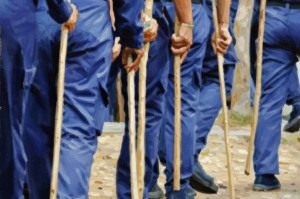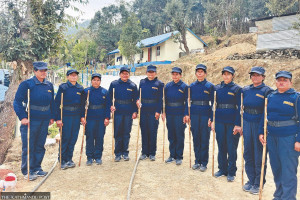Sudurpaschim Province
Children from impoverished families missing school or struggling with attendance
Dropout rates and irregular attendance are high among girls, says Achham local unit official.
Menuka Dhungana
Manisha Bhat, a 14-year-old girl from ward 5 of Mangalsen Municipality in Achham district, studies in grade six. She had been enrolled in school at the age of eight, but does not go to school regularly due to the poor financial condition of her family.
Manisha has seven siblings, but none of them attend school regularly since they have to support their parents with household chores and also work outside to earn money for the family.
Manisha’s brother, aged 16, went to India for work a few months ago as the Bhat family could not afford to pay for his school fee and stationery. Six of his siblings are at home, but they are unable to attend their classes regularly.
According to Manisha, her 61-year-old father has multiple illnesses, and has been unable to work for years. So her mother Bindra Devi Bhat takes care of everyone. “My elder brother quit studies in the eighth grade to seek employment in India to support the family,” said Manisha. She added that she too cannot attend school regularly as her mother alone cannot do all the household chores.
“I do not go to school regularly because my siblings and I have to help my mother with household chores and farm work. My four siblings are very young, so they always need somebody to look after them when we go to work,” said Manisha. “We do not have land for farming, so we buy daily essentials and medicines for my siblings and father by selling firewood. When we need money for emergencies, the whole family spends days collecting and selling firewood,” she added.
Bindra says Manisha is the most honest, obedient, and knowledgeable of all her children. “She wants to complete her studies and become a government officer. But due to my poor financial condition, my children can’t attend school regularly,” said Bindra.
When Manisha manages to go to school, she carries a load of firewood along with her school bag, sells the firewood in the nearest market place, and then goes to school. “I sell firewood and go to school from there,” she shared.
Sarita Bhandari of Palsata in ward 8 of Dhakari Rural Municipality recently turned 13. Her mother died three years ago. Since then she could not attend her classes regularly and eventually quit school last year as she had to do all the household work—cutting grass for the animals, bringing firewood, and working on the farm.
“I asked her to quit school last year as I could not handle all the household work alone. I have three sons and three daughters-in-law. But they live in Mumbai, India. Sarita passed grade three, but had to discontinue studies due to our family problems,” said Sarita’s 61-year-old father Hari Bahadur Bhandari.
While other children her age go to school, Sarita grazes cattle. “I want to study but it is not possible due to our poverty. We have a pair of oxen and a buffalo. My father has chronic asthma. So he cannot do all the household work. How can I study in this situation?” said Sarita.
Manisha and Sarita are just two examples. There are hundreds of children who are either out of school or do not attend class regularly. While girl students outnumber boys in the community schools, the girls often do not attend school regularly.
“The poverty-stricken people enroll their children, mainly daughters, in the community schools. If possible, they send their sons to private schools. Dropout rates and irregular attendance are high among daughters,” said Jagat Rawal, education unit chief of Mangalsen Municipality. According to him, the daughters are often forced to carry out household chores, so it is difficult for them to attend classes regularly.
According to Rawal, there are many school-age children who either do not attend school or are irregular in their studies in Mangalsen Municipality. But the municipality does not have the actual data of these children, he added.
“The people’s representatives, education authorities, teachers, and guardians should work hand in hand to reduce dropout rates and improve school attendance,” said Rawal.




 9.83°C Kathmandu
9.83°C Kathmandu















